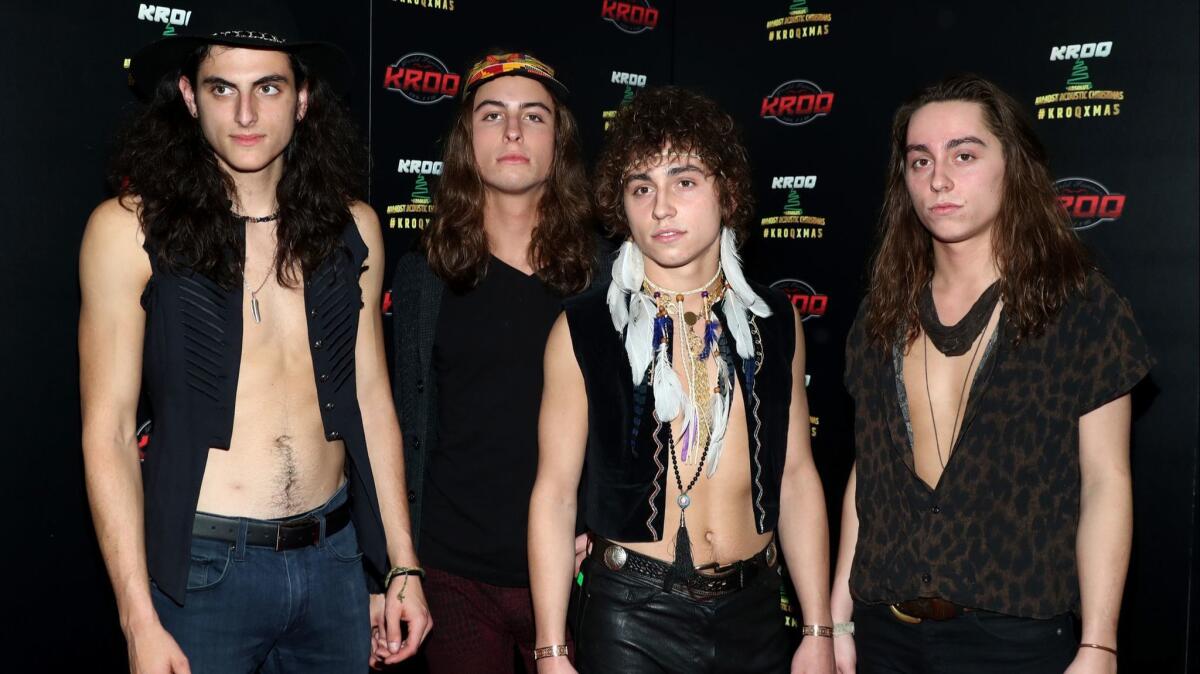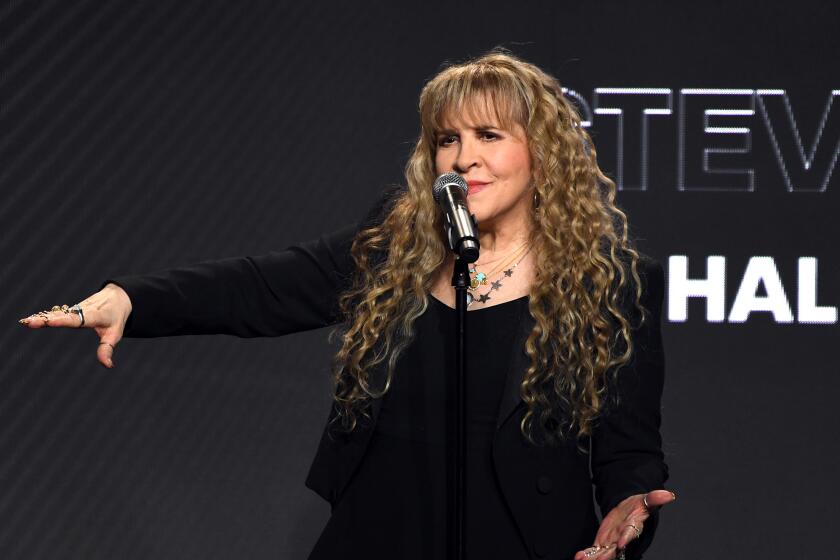Greta Van Fleet just performed on ‘SNL’ and are up for three Grammys. But are they pushing rock backwards or forwards?
- Share via
In mid-January, the quartet of very young rockers in Greta Van Fleet were preparing to make their “Saturday Night Live” debut. For a band just a couple years into a dizzying rise from a Michigan hometown known for its Bavarian kitsch, this was enormous, and band’s members sounded a little bit nervous.
“It’s a really humbling experience,” said guitarist and co-songwriter Jake Kiszka, 22, just hours before they took the stage in New York. “It’s something we grew up watching, so even to be on the stage that so many legends stood on, it’s pretty overwhelming. I don’t know any way you can particularly prepare for that.”
When they finally walked on to perform their singles “Black Smoke Rising” and “You’re the One,” the four were dressed in flamboyant fringe, shirts fully unbuttoned to show their track-team-captain-worthy chests. The Kiszka brothers (Jake, singer Josh, 22, bassist Sam,19) and drummer and family friend Danny Wagner, 20, would have looked the part of hotel-ransacking, ’shroom tea-sippin’ rockers in any era from Monterey Pop to Coachella.
No surprise, perhaps, that Greta Van Fleet had a way to go to live up to the titanic stage presence of their heroes — the Rolling Stones, Led Zeppelin and Eric Clapton, among them. But it’s hard to deny that they are rock and roll’s new ascendant heroes in the mainstream, at a time when the odds are stacked against any band that wants to try.
The group looks poised to bring home a serious haul at the Grammy Awards on Feb. 10. They’re up for rock song, rock performance, rock album and new artist, the only band nominated in that category this year. They’re the type of act that veteran Grammy voters salivate over: a very young combo reverent toward the classics that also hit No. 3 on the Billboard album charts with its 2018 Republic debut LP, “Anthem of the Peaceful Army.”
In a Grammy year when almost every major category seems up in the air, a new band that looks like the Who and pulls hip-hop-size Spotify numbers might be pretty compelling to the Recording Academy.

Being respected in that genre, and also accepted on large scale even among more popular genres like pop and rap, it feels good that rock ’n’ roll isn’t dead.
— Jake Kiszka
“Being respected in that genre, and also accepted on large scale even among more popular genres like pop and rap, it feels good that rock ’n’ roll isn’t dead but that there is place in the music world for that,” Jake Kiszka said.
The quartet’s members likely suspected that a few rock nominations were in store, but the new artist nod took them aback. “We were in L.A. I woke up that morning and my phone had vibrated off the table from so many missed calls and texts. I was like ‘What could possibly be going on?’ I thought someone had died,” Kiszka said.
Greta Van Fleet will be the first to tell you that rock doesn’t need saving, even in a streaming era now dominated by other genres. To wit: Among the act’s new artist contemporaries at the Grammys, R&B prodigy H.E.R. shreds harder on guitar and country vet Margo Price brings more of a ruckus live. Guitar, bass and drums are still in good hands (and more often than not, those hands are female in 2019).
“To some degree, it’s silly. No one single artist can determine the fate of rock’s resurgence,” Kiszka said. “Once something is born, it will be reinterpreted and reinvented. We’re adapting rock ’n’ roll to our time and generation. It’s not just happening in rock; it’s a return of real music and truth and meaning and purpose.”
That’s a sentiment everyone from hippie holdouts to tech-beleaguered Gen Z can get behind. But even though music trends are cyclical, it’s still striking to see a band wear those vintage influences so openly and find such a huge intergenerational audience (after Greta Van Fleet’s “SNL” set, sales and streams jumped 60% overnight). Acts like the Strokes, the White Stripes and Arcade Fire have ridden similar return-to-roots hype waves before, and Maroon 5 and Imagine Dragons have found huge success melding rock with electronic pop.
But Greta Van Fleet is one of the first riff-based acts to ascend in an era when rock’s also-ran status at streaming is taken for granted. On singles like “Black Smoke Rising” and “You’re the One,” nimble blues riffing and Josh Kiszka’s high wails sound like they’re spilling out of “Led Zeppelin I” (Robert Plant approves: He once winkingly told an Australian TV station, “There’s a band in Detroit called Greta Van Fleet…Beautiful little singer, I hate him.”)
For any artist, it’s an important job to be a mirror for society and reflect on issues we’re concerned about.
— Jake Kiszka
Sure, songs like “Flower Power” (“Electric gold, our love with tender care / Hills of satin grass and maidens fair) have a Tolkien-esque pomp that Johnny Rotten thought he strangled to death in the ’70s. But in an era when even Tyler, the Creator has an album called “Flower Boy” and plenty in Highland Park are buying spell books, Greta Van Fleet’s earnest mysticism and environmental concern prove savvy and modern.
“It would be a puzzling thing to identify as a throwback band. We’re very much a product of the current environment,” Kiszka said. “It’s living in these times, being influenced by what’s around us. For any artist, it’s an important job to be a mirror for society and reflect on issues we’re concerned about. ‘Watching Over’ and ‘Age of Man’ are about decay of the Earth, what we’ve done to it, how we’ve been blind to it.”
Not everyone’s impressed, however. In a rare revival of its old caustic tone, Pitchfork said that “Greta Van Fleet sound like they did weed exactly once, called the cops, and tried to record a Led Zeppelin album before they arrested themselves. The poor kids from Frankenmuth, Michigan don’t even realize they’re more of an algorithmic fever dream than an actual rock band.”
And drummer Jason Bonham, who knows a thing or two about Zeppelin comparisons, said: “Just because [Josh Kiszka] sings high and he does his hand-on-the-hip thing, I just worry the hype that the band are getting, it will ruin them.”
The band is ready for detractors.
“The larger you get, it automatically puts more attention on you,” Kiszka said. “It may be a lack of effort to listen and identify with it. There will always be disinterested people. It wouldn’t be art if it weren’t pissing someone off, so maybe it’s a positive thing too.”
Greta Van Fleet’s combination of impeccable vintage aesthetics and youthful buzz should put a spring in the step of Grammy voters who want a rock band to champion (the family-band-as-rock’s-redeemers thing has worked pretty well for Kings of Leon and Haim). On the other hand, what kind of algorithm would see a young band that cites John Lee Hooker and Woody Guthrie as major influences playing “SNL” in 2019?
As the most open-ended Grammys in years take shape, Greta Van Fleet looks to be a favorite in the rock categories, even if purists and skeptics likely won’t be swayed either way, and posthumous competition from Chris Cornell or the artier Ghost, St. Vincent and Arctic Monkeys might pull out a win or two.
But Greta Van Fleet has captured something about the current moment in music. In a relentless tech-driven push toward an unknown and perhaps malevolent future, a hip-shaking guitar riff and lyrics about yearning for a more peaceful world are comforting all over again.
“The ways you can articulate emotion should be in your playing, your hands and fingers, and in your writing,” Kiszka said. “It doesn’t have to be overcomplicated.”
For breaking music news, follow @augustbrown on Twitter.
More to Read
The biggest entertainment stories
Get our big stories about Hollywood, film, television, music, arts, culture and more right in your inbox as soon as they publish.
You may occasionally receive promotional content from the Los Angeles Times.











